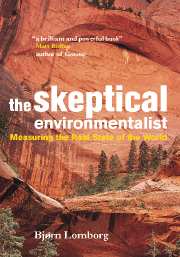Book contents
- Frontmatter
- Contents
- List of figures
- List of tables
- Preface
- Language and measures
- Acknowledgements
- Permissions
- Part I The Litany
- Part II Human welfare
- Part III Can human prosperity continue?
- Part IV Pollution: does it undercut human prosperity?
- 15 Air pollution
- 16 Acid rain and forest death
- 17 Indoor air pollution
- 18 Allergies and asthma
- 19 Water pollution
- 20 Waste: running out of space?
- 21 Conclusion to Part IV: the pollution burden has diminished
- Part V Tomorrow's problems
- Part VI The Real State of the World
- Notes
- Bibliography
- Index
19 - Water pollution
Published online by Cambridge University Press: 05 March 2013
- Frontmatter
- Contents
- List of figures
- List of tables
- Preface
- Language and measures
- Acknowledgements
- Permissions
- Part I The Litany
- Part II Human welfare
- Part III Can human prosperity continue?
- Part IV Pollution: does it undercut human prosperity?
- 15 Air pollution
- 16 Acid rain and forest death
- 17 Indoor air pollution
- 18 Allergies and asthma
- 19 Water pollution
- 20 Waste: running out of space?
- 21 Conclusion to Part IV: the pollution burden has diminished
- Part V Tomorrow's problems
- Part VI The Real State of the World
- Notes
- Bibliography
- Index
Summary
About 71 percent of the Earth is covered by the salt water of the oceans. Lakes constitute scarcely half a percent of the surface of the Earth. Half of these are freshwater lakes, and the rivers in turn constitute only 0.2 percent of the area of freshwater lakes.
Obviously, coastal waters, rivers and lakes are far more important to people than the oceans – primarily because we live much closer to them – but it still illustrates how enormous the oceans are in comparison to the bodies of water we are used to dealing with.
Oil pollution in the oceans
On the subject of ocean pollution, it is traditional to quote Thor Heyerdahl. In 1947 he traversed the Pacific on his Kon Tiki expedition, without catching sight of people, ships or rubbish for weeks. On his second expedition in 1970, on the other hand, when he crossed the Atlantic with his boat the Ra II, he saw “far more oil lumps than fish.” Heyerdahl concluded: “It became clear to all of us that mankind really was in the process of polluting its most vital well-spring, our planet's indispensable filtration plant, the ocean.”
- Type
- Chapter
- Information
- The Skeptical EnvironmentalistMeasuring the Real State of the World, pp. 189 - 205Publisher: Cambridge University PressPrint publication year: 2001



